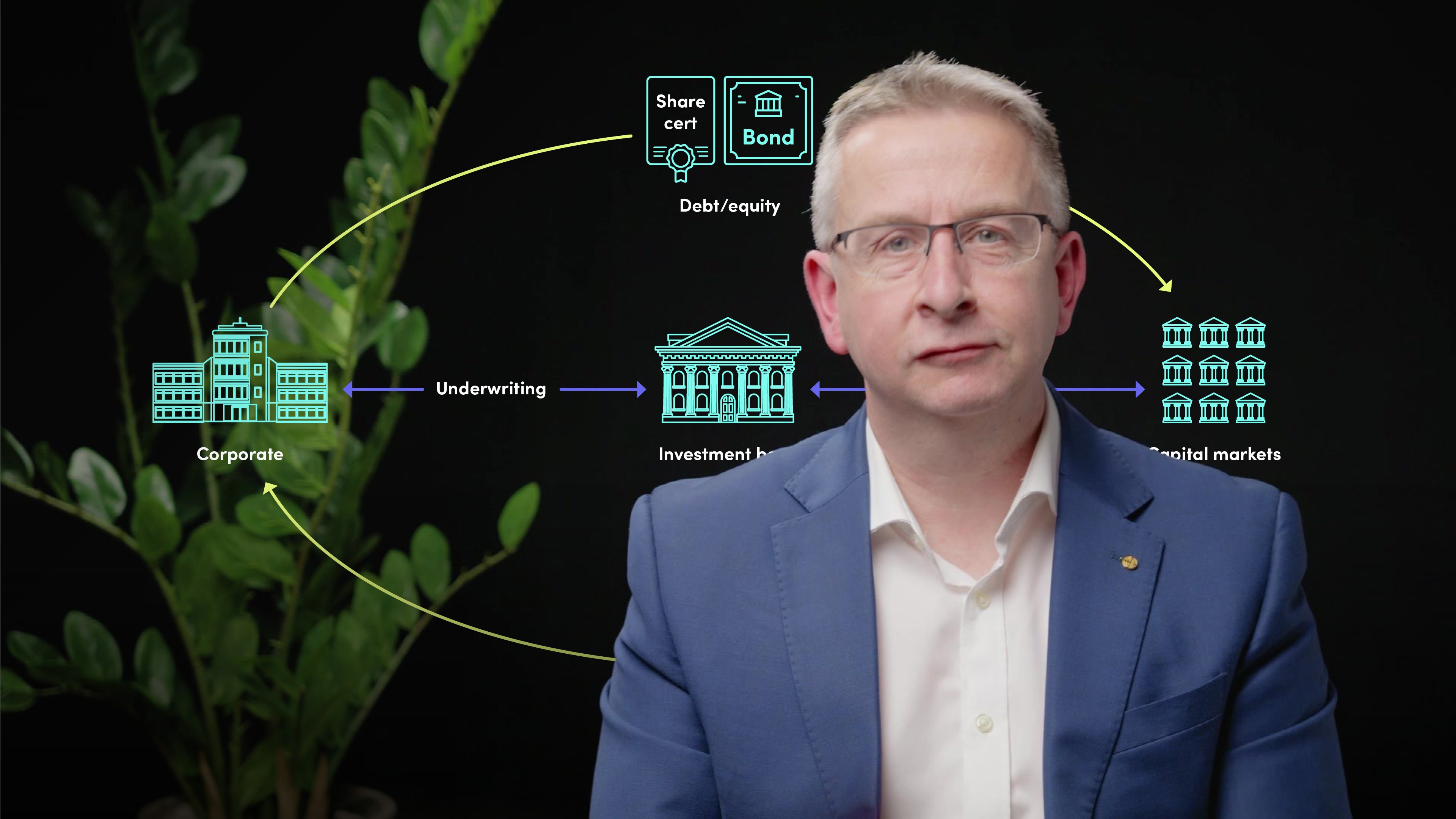
Wholesale Banking and the Green Economy

Simon Thompson
Managing Director and Author
In this video, Simon explores the pivotal role of wholesale banks in facilitating the transition to a sustainable, low-carbon economy. Despite green lending's rapid growth, it remains a small portion of total lending. He explains the range of products offered by wholesale banks, including green loans, sustainable leasing, and corporate deposit schemes, designed to incentivise and finance eco-friendly activities. We further delves into the importance of aligning with the Principles for Responsible Banking to drive sustainable finance.
In this video, Simon explores the pivotal role of wholesale banks in facilitating the transition to a sustainable, low-carbon economy. Despite green lending's rapid growth, it remains a small portion of total lending. He explains the range of products offered by wholesale banks, including green loans, sustainable leasing, and corporate deposit schemes, designed to incentivise and finance eco-friendly activities. We further delves into the importance of aligning with the Principles for Responsible Banking to drive sustainable finance.
Subscribe to watch
Access this and all of the content on our platform by signing up for a 7-day free trial.

Wholesale Banking and the Green Economy
13 mins 35 secs
Key learning objectives:
Understand the role wholesale banks can play in the transition to a low-carbon economy
Outline some of the products available from wholesale banks facilitating the transition to a low-carbon economy
Overview:
To attain net zero, almost every economic sector must decarbonise, necessitating the significant role of wholesale banks in shifting capital from high to low-carbon activities. Despite green lending reaching over $500 billion in 2021, it constitutes a minor 4% of total bank lending. Post the Paris Agreement, banks have initiated 'green loans' to aid low-carbon transition and started green corporate deposit schemes. However, advancements in 'green leasing' and 'sustainability-linked loans' are still essential. Upholding the United Nations Principles for Responsible Banking, banks are urged to infuse green and sustainable principles in their operations. Industry-wide, institutional, and individual alignment is crucial to realise these principles fully. Banks must spearhead the transition to a sustainable, low-carbon world.
Subscribe to watch
Access this and all of the content on our platform by signing up for a 7-day free trial.
What is the function of wholesale banks?
Wholesale banks, also known as corporate banks, operate at a larger scale than retail banks, catering specifically to the more complex financial needs of larger corporations, other financial institutions, and even governments. They offer a broad range of services, which include providing deposit and treasury facilities, large-scale corporate loans, project finance for major infrastructure and industrial projects, and trade finance, supporting global commerce. Moreover, through their investment banking arms, they help companies raise debt and equity finance in national and international capital markets.
What role can wholesale banks play in the transition to a low-carbon economy?
Wholesale banks are in a unique position to influence the transition to a low-carbon economy. By shifting their focus from high-carbon to low-carbon sectors and activities, they can play an instrumental role in the decarbonisation of the economy. Even though 'green lending' comprised only 4% of total bank lending in 2021, wholesale banks have the potential to greatly expand this proportion. Their lending practices can encourage and support environmentally sustainable activities and help firms in transition towards a more sustainable model of operation. They can also mobilise private capital for sustainable investment and integrate climate risks into their advisory services, thereby stimulating a broader market shift towards sustainability.
What products are being offered by wholesale banks facilitating the transition to a low-carbon economy?
Wholesale banks have devised several strategies to aid the transition to a low-carbon economy:
'Green loans' encourage investment in energy efficiency improvements, low-carbon assets, and climate change mitigation projects.
'Green corporate' deposit schemes allow firms to ensure their deposits are invested in environmentally positive projects.
'Green leasing' provides clients with energy-efficient equipment or renewable energy assets at preferential rates, encouraging the uptake of sustainable technologies.
'Sustainability-linked loans' (SLLs) offer financial incentives like lower interest rates to firms achieving specific sustainability targets, promoting improved environmental performance.
Innovations such as the Sustainable Shipment Letter of Credit support the export of sustainable commodities, thereby incentivising sustainable production. These products collectively assist in integrating sustainability into the core banking activities, promoting the shift towards a low-carbon economy.
What role will the Principles for Responsible Banking play in the transition to a low-carbon economy?
The Principles for Responsible Banking, launched by the United Nations, act as a guide for banks globally to align their strategies with the Paris Climate Agreement and the UN Sustainable Development Goals. Encouraging a shift towards sustainable finance, the principles call for banks to increase positive environmental impacts, reduce negative ones, and work collaboratively with stakeholders. Thus, they play a crucial role in leading the financial industry's transition to a low-carbon economy.
Subscribe to watch
Access this and all of the content on our platform by signing up for a 7-day free trial.

Simon Thompson
There are no available Videos from "Simon Thompson"





























